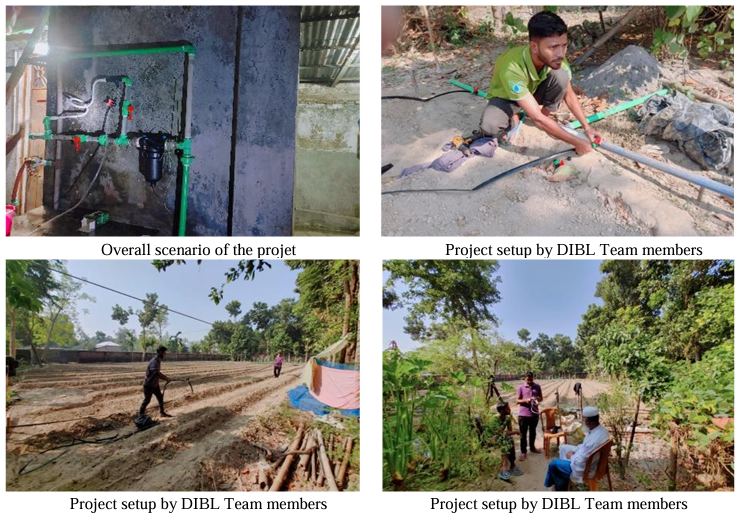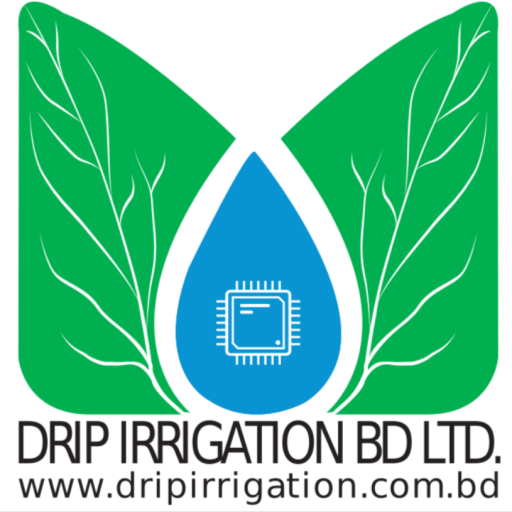Have you ever wondered what goes into creating a successful and water-efficient farm? It all starts with a solid foundation, and that includes a well-designed and expertly installed irrigation system. In Bangladesh, Drip Irrigation BD Ltd. (DIBL) takes pride in ensuring that every project begins with precision and care. This recently uploaded project screenshot captures our dedicated team members in action, meticulously setting up a drip irrigation system that promises to bring significant benefits to local farmers, addressing the critical need for efficient water management in their fields.

Project Details:
This project showcases various stages of the drip irrigation system setup by the DIBL team in a rural area of Bangladesh. The images depict the initial plumbing connections, the laying of main and lateral pipelines across the field, and the careful positioning of drip lines to cater to the specific planting layout. The implementation is being carried out directly by DIBL team members, highlighting our commitment to providing end-to-end solutions. This project aims to address the challenges of inconsistent water availability and inefficient traditional irrigation methods that often lead to water wastage and suboptimal crop growth in the region. Our drip irrigation systems are designed with ease of installation in mind. While some farmers may choose to handle the main pipeline setup themselves, the more intricate connections and emitter placements can be efficiently managed by a local plumber or technician. Importantly, our DIBL engineers are always on hand to provide comprehensive support and guidance, ensuring a smooth and effective installation process for every project.
Key Benefits for Farmers & Entrepreneurs:
Implementing our expertly set up drip irrigation systems unlocks a range of crucial benefits for farmers and agricultural entrepreneurs in Bangladesh:
- Water Efficiency: Traditional surface irrigation can waste a significant amount of water through evaporation and deep percolation. Research indicates that drip irrigation can reduce water consumption by 40-60% while maintaining or even increasing crop yields (Source: FAO, “Modern Water-Saving Irrigation Technologies”). This efficient water use is particularly vital in regions facing seasonal water scarcity. As one farmer involved in a similar DIBL project commented, “Before, I spent so much time and money on watering, and still my crops suffered during dry spells. Now, with drip irrigation, I use far less water, and my plants are consistently healthy.”
- Crop Yield Improvement: By delivering water and nutrients directly to the root zone, drip irrigation optimizes plant uptake, leading to healthier growth and significantly improved yields. This is particularly beneficial for high-value crops such as vegetables, fruits like mango and lychee, and cash crops. Feedback from our past projects suggests yield increases ranging from 20% to over 50%, depending on the crop and farming practices.
- Cost Savings: The reduction in water usage directly translates to lower water bills and reduced energy costs for pumping water. Furthermore, the precise application of water and fertilizers through drip systems minimizes waste, leading to substantial savings on these essential inputs.
- Automation & Smart Features: Our drip irrigation systems can be equipped with timers and automated controllers, allowing for scheduled irrigation cycles that optimize water use and reduce the need for constant manual oversight. While not explicitly visible in this setup phase, future integration of soil moisture sensors and IoT technology can further enhance efficiency through real-time adjustments based on actual plant needs.
- Long-Term Sustainability: Drip irrigation is an environmentally responsible approach to farming. By minimizing water runoff and deep percolation, it helps prevent soil erosion and nutrient leaching, contributing to healthier soil and a more sustainable agricultural ecosystem.
- Weed Control: The localized watering provided by drip irrigation keeps the soil surface between rows relatively dry, which significantly inhibits weed germination and growth. This reduces the need for manual weeding and the application of herbicides, saving farmers time and money while promoting a healthier environment and potentially reducing the need for fertilizers as weeds compete less for nutrients.
- Time and Labor Savings: Automated or even well-designed manual drip systems significantly reduce the time and labor required for irrigation. Farmers can allocate their time to other crucial farm management tasks, improving overall productivity.
- Initial Investment vs. Long-Term Savings: While the initial cost of installing a drip irrigation system might seem higher than traditional methods, the long-term savings in water, fertilizer, and labor costs, coupled with increased yields, make it a highly economical choice. Consider the experience of a farmer in Chattogram who implemented a DIBL system for his vegetable farm: “Initially, I was hesitant about the cost, but within a year, the increased production and reduced expenses more than made up for it. It’s a smart investment for the future.”
Real-Life Impact & Success Stories:
The images here represent the initial steps towards another success story powered by DIBL. Across Bangladesh, our projects have transformed farming communities. For instance, in a tomato cultivation project in Bogura, farmers using our drip systems reported a 40% increase in yield and a 60% reduction in water usage compared to their previous flood irrigation methods. These tangible results demonstrate the power of efficient irrigation in improving livelihoods and ensuring food security. We also actively inform farmers about any available government subsidies or support programs that can help them adopt these advanced irrigation technologies.
Inspiration & Business Opportunities:
Witnessing the meticulous setup of a DIBL drip irrigation system should inspire other farmers and entrepreneurs to consider adopting similar efficient practices. For those looking to upgrade their irrigation methods, we recommend starting with a thorough assessment of their water resources and crop requirements. The agricultural sector in Bangladesh presents significant opportunities for businesses involved in the supply, installation, and maintenance of modern irrigation systems. We encourage new agribusiness startups to explore this growing field and partner with Drip Irrigation BD Ltd. to contribute to the advancement of sustainable agriculture in the country.
Project Location:
Location: Rural agricultural region, Bangladesh (Specific district details available upon request for privacy reasons).
Call to Action & Company Contact Details:
Ready to optimize your farm’s water usage and boost your yields? Contact Drip Irrigation BD Ltd. today to learn more about our customized drip irrigation solutions and expert installation services!
Contact Us:
Email: [email address removed] Website: www.dripirrigation.com.bd
Head Office:
Address: 2C/81, Parijat Apartment, North Adabor, Shyamoli, Dhaka-1207 Phone: 01324-445400 | Email: [email address removed] Representative: Sadman Sarar (Public Relations Officer)
Branches:
Dhaka: Address: 2C/81, Parijat Apartment, North Adabor, Shyamoli, Dhaka-1207 Phone: 01324-445411 | Email: [email address removed] Representative: Tanbirul Islam, Assistant Engineer
Chattogram: Address: A3/1st floor, Nazma Tower, Munni Commissioner Goli, Oxygen, Chattogram-4214 Phone: 01324-445395 | Email: [email address removed] Representative: Mobinul Islam, Assistant Engineer
Bogura: Address: 4A, Twin Brother Phulbari Plaza, Santhahar Road, Charmatha, Bogura-5800 Phone: 01324-445385 | Email: [email address removed] Representative: Md. Samsuzzaman Sumon, Assistant Director
Jashore: Phone: 01324-445390 | Email: [email address removed] Representative: Md. Masud Rana, Assistant Engineer
Sylhet: Address: Queen’s tower, lift (4-A), near by over bridg, kadamtoli, Sylhet Phone: +880 1919-751845 Representative: Asadul Islam Shahoria, Sub-Assistant Engineer
{ “@context”: “https://schema.org”, “@type”: “FAQPage”, “mainEntity”: [ { “@type”: “Question”, “name”: “What does the drip irrigation system setup process involve in Bangladesh?”, “acceptedAnswer”: { “@type”: “Answer”, “text”: “The setup process typically involves several key stages, including initial site assessment, planning the layout based on the crops and field topography, installing the main and lateral pipelines, connecting emitters at precise locations near the plants, and ensuring proper filtration and pressure regulation. Drip Irrigation BD Ltd.’s team meticulously handles these steps to ensure optimal efficiency and water distribution for the farmers.” } }, { “@type”: “Question”, “name”: “How easy is it for farmers in Bangladesh to set up a drip irrigation system?”, “acceptedAnswer”: { “@type”: “Answer”, “text”: “While the main pipeline installation can often be managed by the farmers themselves, the more intricate aspects like emitter placement and connections might require the expertise of a local plumber or technician. Drip Irrigation BD Ltd. provides comprehensive guidance and our engineers are always available to offer support and ensure a smooth installation process. We strive to make the technology accessible and user-friendly for all farmers.” } }, { “@type”: “Question”, “name”: “How long does it typically take for DIBL to set up a drip irrigation system on a farm?”, “acceptedAnswer”: { “@type”: “Answer”, “text”: “The installation time can vary depending on the size and complexity of the farm, the type of crops being cultivated, and the specific requirements of the irrigation system. However, our experienced DIBL team works efficiently to minimize disruption and ensure a timely setup. We conduct a thorough site assessment beforehand to provide a realistic timeline for each project.” } }, { “@type”: “Question”, “name”: “Does DIBL provide any training or support after the drip irrigation system is set up?”, “acceptedAnswer”: { “@type”: “Answer”, “text”: “Yes, Drip Irrigation BD Ltd. is committed to providing comprehensive after-sales support. This includes training farmers on the proper use and maintenance of the drip irrigation system to ensure its longevity and optimal performance. Our team remains available to address any queries or concerns that farmers may have after the installation.” } }, { “@type”: “Question”, “name”: “What are the key factors DIBL considers when setting up a drip irrigation system for a specific farm in Bangladesh?”, “acceptedAnswer”: { “@type”: “Answer”, “text”: “Several crucial factors are taken into account, including the type of soil, the specific water requirements of the crops being grown, the topography of the land, the availability and quality of the water source, and the farmer’s budget and preferences. Our tailored approach ensures that each drip irrigation system is designed and set up to maximize water efficiency and crop yield for the individual farm.” } } ] }

